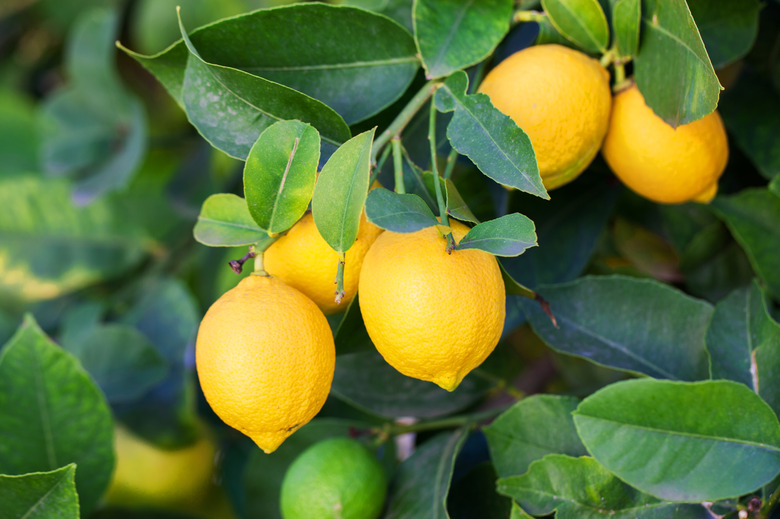How To Know When To Pick Lemons
Lemon laws do not protect the consumer from purchasing unripe lemons, but perhaps they should. When you cut open one of these citrus fruits, you probably expect firm flesh and lots of juice, but knowing when to pick lemons can have a big impact on the results. So anything less spells culinary heartbreak. If you have your own lemon tree (Citrus x limon), you can forestall disappointment by learning the secrets of picking ripe fruit.
Basics of Lemon Trees
Basics of Lemon Trees
A lemon tree in your backyard orchard ensures a ready supply of the juicy citrus fruits. Various cultivars of lemon trees are hardy in U.S. Department of Agriculture plant hardiness zones 9 and 11. Some of those cultivars, including Eureka (Citrus limon 'Eureka,' zones 9-10), fill the tree with bright fruits almost year round. You can also grow dwarf lemon trees indoors that produce fruit when you pollinate the tree. Fruits aren't ripe until the color develops, but just because a lemon is a particular shade of yellow doesn't mean it's ripe.
Time to Maturity
Time to Maturity
All of those juicy lemons on your tree start as fertilized flowers. Lemons usually take four to nine months to ripen from the time the flowers become fertilized, after successful pollination. Most lemon varieties ripen in fall and winter, but some are ready earlier or produce lemons year-round. Eureka lemons often ripen in spring and summer while Lisbon (Citrus limon 'Lisbon') lemons are usually ripe from summer to fall.
Signs of Lemon Ripeness
Signs of Lemon Ripeness
If you pluck some other kinds of fruits from their trees before those fruits are ripe, it takes only a little patience until they ripen. The same maneuver with a lemon will buy you disappointment. Lemons ripen on the tree or not at all. So getting your harvest timing right to pick lemons is critical.
Ripe lemons are a brilliant shade of yellow or yellow-orange and have a shine to their skin, but they can appear yellow before they're ready to pick. Wrinkled or dull skin means that you waited too long; the fruits are past their prime.
Lemon Taste Test
Lemon Taste Test
All the eyeballing in the world isn't sufficient to identify a ripe lemon, however. You're better off taste-testing one fruit to judge the ripeness of the rest of the tree's lemons. Know what fruit you taste, though. Cultivars such as Eureka and Lisbon offer tart, juicy fruits at harvest time, while the lemon-orange hybrid Meyer lemon (Citrus x limon 'Meyer,' zones 8b-11) is milder and sweeter.
How to Pick Lemons
How to Pick Lemons
Wearing cotton gloves when you pick lemons protects the rinds. Hold the lemon in your hand and twist it lightly as you pull it way from the branch. Using hand pruners to trim the stem from the lemon keeps it from poking the other lemons you harvest.
Lasting Lemon Pleasure
Lasting Lemon Pleasure
When your tree's lemons ripen, you may have more on your hands than you can possibly use. The best choice for storing the fruits is on the tree. Hard freezes, however, damage lemons. So pick all the ripe fruits if a bad weather system is expected.
Ripe fruits store well in a plastic bag in a refrigerator for one or two weeks, depending on the variety. Meyer lemons don't last as long as more tart lemons. An alternative to storing lemons in a refrigerator is to juice the fruits and keep the juice in your freezer for future use.
